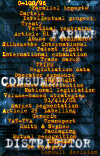
importation médicament vétérinaire
importation of veterinary medicine
La question des importations personnelles de Produits PhytoPharmaceutiques (PPP) par les agriculteurs est enfin portée devant la CJCE. ( communiqué ) 02 juin 2006
The question of " own-use " parallel imports of Plant Protection Products (PPP) by the users - farmers is finally brought to the European Court of Justice (ECJ). ( Press-release ) 02 June 2006
Défi lancé au marché unique européen
L'affaire C-100/96
Challenge to the single market
the British Agrochemical case
Importation pour usage personnel
PSD-parallel imports
'Complete text'
ECJ
judgment C-100/96
C-100/96
en français
High Court
judgment
Mr Justice Richard
[Just. Rich. en français]
Zimovane
case - en
Zimovane
C94/98 - fr
EU Parliementary questions
Market transparency in agriculture
Exhaustion
of trade mark rights 1998
-answer-
Exhaustion of trade mark rights (1) 2000
Exhaustion of trade mark rights (2) 2000
Admissibility
of parallel imports 2000
Questions parlementaires EU
-
Epuisement du droit conféré par le marque 1998
Epuisement du droit conféré par la marque (1) 2000
Epuisement du droit conféré par la marque (2) 2000
Autorisation
des importations parallèles 2000
-
-
Facts - figures
Overview of Pesticide Industry
Flow of pesticides to farmers - UK dpt environment
PARALLEL IMPORTS IN PHARMACEUTICALS: IMPLICATIONS FOR COMPETITION AND PRICES IN DEVELOPING COUNTRIES - Keith E. Maskus
![]()
b.bodson_trends-tendances_12 november 1998_chardons dans l herbe verte_fr
B.Bodson_trends-tendances_12 november 1998_thistles in the green grass_uk
anne gillet_la france agricole_26 june 1998_Reglementation des produits phytos
cd_circuits culture_july 1998_audace reprend le flamheau des importateurs de phytos
guy laluc_fruits et legumes_sept1998
magasin agricole_september 1998_audace part a la conquete des dysfonctionnements du marche phyto
circuit culture_9 november 1998_importations de phytos_vers une autorisation simplifiée_fr
Agrow N316 13 November 1998.pdf
daniel roques_lettre de mise en demeure de la france_paris 03 november 1998_fr.
daniel roques_formal letter of warning to france_paris 03 november 1998_uk
Sénat_Bernard Fournier_Séance du 9 décembre 1998_import parallel
No common prices for farmers in the common market! - CEJA
LCaillaud_Agrodistribution_Bagarre sur les génériques_mars-avril 1999
AUDACE letter to farmers in the United Kingdom
Daniel Roques_lettre a Mr R Mestres_18 mars 1999_fr
R Mestres_lettre a D Roques AUDACE_15 avril 1999_fr
PSD News Release: Ruling on Pesticides Parallel Imports
Daniel Roques_lettre a Mme M Decoin PHYTOMA_22 avril 1999_fr
Daniel Roques_lettre a Mr A Vernede_11 mai 1999_fr
Daniel Roques_lettre a Mr R Mestres_18 mai 1999_fr
Circuits Culture Mai 1999 - Phytos: bilan 1998
Agrow 28May1999 N329 page9.pdf
AUDACE communiqué press release_25aout1999 English
ARGOS n°109 janvier 2001 AUDACE répond aux questions
L'Arrêt de la Cour d'Appel de Douai du 8 février 2000
Presse release following the Order N° 2001-317 of 4 April 2001
communiqué suite au Décret N° 2001-317 du 4 avril 2001
Nach dem gerichtlichen Erfolg von AUDACE...

...the state of affairs regarding crop protection products with regard to the successful court cases engineered by AUDACE

Défi lancé au marché unique européen
L'affaire C-100/96
> Farmers should benefit from trade liberalisation by shopping around for the cheapest inputs whiles competing on the world market for their produce
> Transnational corporations that dominate the world markets for food and health products should not be allowed to set prices per country
PSD-MAFF
The industry seeks changes to PSD's arrangements
for parallel imports of pesticides into the UK
UIPP : oui a la libre circulation non a leur libre commercialisation
Farmers are price takers and they are operating in an increasingly competitive environment
Florence bal_cultivar_16 february 1995_du rififi dans les phytos
assistance for a translation ?
eliminer les dangereux et les illegaux_cultivar 16 may 1995_fr
They want you to pay the highest price !
Whereas they shop around the world for cheap labour, cheap inputs and mobile capital.
Let us have transparency in transfer pricing !
Let us have transparency in R&D costs !
IMPORTATEUR CONDAMNE_circuits culture_avril 1997_fr

Globalization for whom ?
A qui doit profiter la
globalisation ?
Will farmers or consumers benefit from trade liberalisation ?
Questions to Commissionner Pascal LAMY
Are patents
(the state of the art) always implemented ?
26th Oct 2000 :
The association AUDACE denounces a sophism and asks its authors to justify themselves
The assertions according to which differences in plant protection product formulations would be justified taking into consideration climatic, agronomic and/or, in general, health or environmental conditions specific to each EU Member State amounts to a pure sophism skilfully fostered by the manufacturers.
Certain competent authorities, administrative and judicial, national and European however appear not to be convinced yet of this reality and while agreeing that one same formulation must be authorised on the whole territory of a State where, however, there exist extremely different climates and soils, they deny the right for that formulation to be used systematically on the territories of other Member States.
In order to close this controversy, could the manufacturers and/or competent authorities quote only one product among the thousands of specialities authorised in Europe for which the need for different formulations between the States would be scientifically proven ?
The absence of response to this request should put an end to a long and unbearable polemic bringing benefit only to the marketing aims of transnational corporations.
Challenge to the single market
the British Agrochemical case
A FORUM WAS HELD IN 1999 IN THE AFTERMATH OF JUSTICE RICHARD'S JUDGMENT
Durant l'été 2000 AUDACE dépose une plainte contre le Royaume Unis auprès de la Commission européenne ! Mais moi je suis français, suis-je concerné ?
Why AUDACE filed a complaint against the UK ?
Parallel importing, that is the importation of a product through channels other than those arranged between the manufacturer of the product and its authorised distributors, is generally considered to promote price competition in a market.
Not surprisingly, parallel imports are opposed by some manufacturers, who seek to engage in significant price discrimination by geographic area.
Not surprisingly then, that in order to maintain their monopolist profits on the EU market, multinational producers within the British Agrochemicals Association Ltd (BAA), now called Crop Protection Association (CPA), attempted to constrain PSD's approval procedures and condition of approval for parallel imports, (indeed, the UK had been the first member state to implement such legislation in the eighties and this had a direct influence on other member states), and judicially reviewed the Ministry of Agriculture, Fisheries and Food 's interpretation of EC Council Directive 91/414 concerning the marketing of plant protection products.
This case was not resolved in the High Court in London and was referred to the European Court of Justice (case later to be known as C-100/96). On the 11 March 1999 the ECJ ruled clearly in favour of parallel imports.
Following this judgment PSD amended its 'arrangements' in April 1999. AUDACE was satisfied ! [AUDACE's first letter to Bristish farmers sent to the UK agricultural press October 1999].
Some months later, after the case had come back to the UK, a judgment was handed down by Mr Justice Richards in the High Court on 4th November.
AUDACE disputes the terms of this judgment which eludes the questions referred to the ECJ (what C-100/96 says precisely) as it eludes the directive (what the dir 91/414 says) and confuses the issues of safety and protection of the environment with that of competition rules (detail of Mr Justice Richard's judgment)
PSD appealed,
yet, on the 19th November 1999, PSD gives in, and requires exact equivalence:
T'he judgment requires that PSD should insist on exact equivalence of formulations to establish the identicality of the parallel import to the master product.' (says PSD)
Clearly, this meant:
-
issuance of parallel import registrations came to a stand still
-
transnational producers insisting on exact equivalence introduced miner changes to formulations leading to 'commercial withdrawals of registrations'
-
new products introduced in different member states increased market segmentation and monopoly profit
-
so called 'new, improved formulations' of existing products appear, but not in every national market, so that they have the primary effect of preventing parallel import
-
the industry (CPA) stand point is based on the judgement of 4th November 1999 (of which AUDACE disputes the terms in respect of ECJ C-100/96) and on the need for differences in formulations between Member States, when in fact there exists as many agronomic and climatic differences on the territory of one Member State as there are between states, whereas the registration of a formulation is national (this unbearable polemic around formulations and climatic or environmental conditions brings benefit only to the marketing aims of transnational corporations)
In the Community law, these issues have for the most part been framed in terms of article 30 of the EC Treaty dealing with the free movement of goods. The Commission has fought consistently against the industry's ever growing demand for Intellectual Property (IP) protection probably not so much because of any opposition to IP rights per se, but more that any outcome that might be perceived to partition the market would run counter to the underlying goal of a single common market. The jurisprudence of the ECJ consistently supports the Commission's position.
Case C-94/98 of 16th December 1999 known as the Zimovane [zimovane explained] case puts it squarely and leaves no room for producers to modulate their formulations in view of partitioning the market.
However, in the course of summer 2000 AUDACE was left with no alternative and filed a complaint with the EU Commission.
Parallel importers make their purchases in the national markets where goods are cheapest, and import them into countries with higher prices. This price competition for the same good is an advantage for consumers. Likewise, farmers can benefit from trade liberalisation by shopping around for the cheapest inputs whiles competing on the world market for their produce. Parallel imports can be an important source of price competition for many goods.
There is particular interest for imports in pharmaceuticals and agrochemicals. Those products have a large and captive customer base and high profit potentials and their distribution is heavily regulated in every country. At the same time world markets for food and health products are dominated by fewer than ten Multinational Enterprises and this number is declining rapidly.
Information on the state of affairs regarding crop protection products with regard to the successful court cases engineered by AUDACE
L'Arrêt de la Cour d'Appel de Douai du 8 février 2000
un jugement fort motivé
AUDACE fait progresser la jurisprudence et
arrête définitivement les actions illégitimement menées
contre la distribution et les agriculteurs
fondées sur les dispositions de la
loi n° 525 du 2 novembre 1943
2007 et après :
Looking for the future :
 amending
directive 91/414/EEC:
amending
directive 91/414/EEC:
see the following pages :
-
A strong generic competition for a sustainable agriculture and an innovative dominant industry
-
PPP imports by users, farmers and amateur gardners, within the limit of their personal needs
included,
AUDACE's comments and observations
on the proposals for
Regulation [ 2006/0136 ( COD ) - COM ( 2006 ) 388 final ]and
Directive [ 2006/0132 ( COD) - COM ( 2006 ) 373 final ]
relating to the marketing and sustainable use of Plant Protection Products
(PPP) ![]() (0,140 MB)
(0,140 MB)
voir les pages suivantes :
inclus, les Commentaires et observations d'AUDACE sur les propositions
de règlement [ 2006/0136 ( COD ) - COM ( 2006 ) 388 final ]
et
de directive [ 2006/0132 ( COD) - COM ( 2006 ) 373 final ]
concernant la mise sur le marché et l'utilisation durable
des Produits PhytoPharmaceutiques ( PPP )![]() (0,26 MB)
(0,26 MB)

